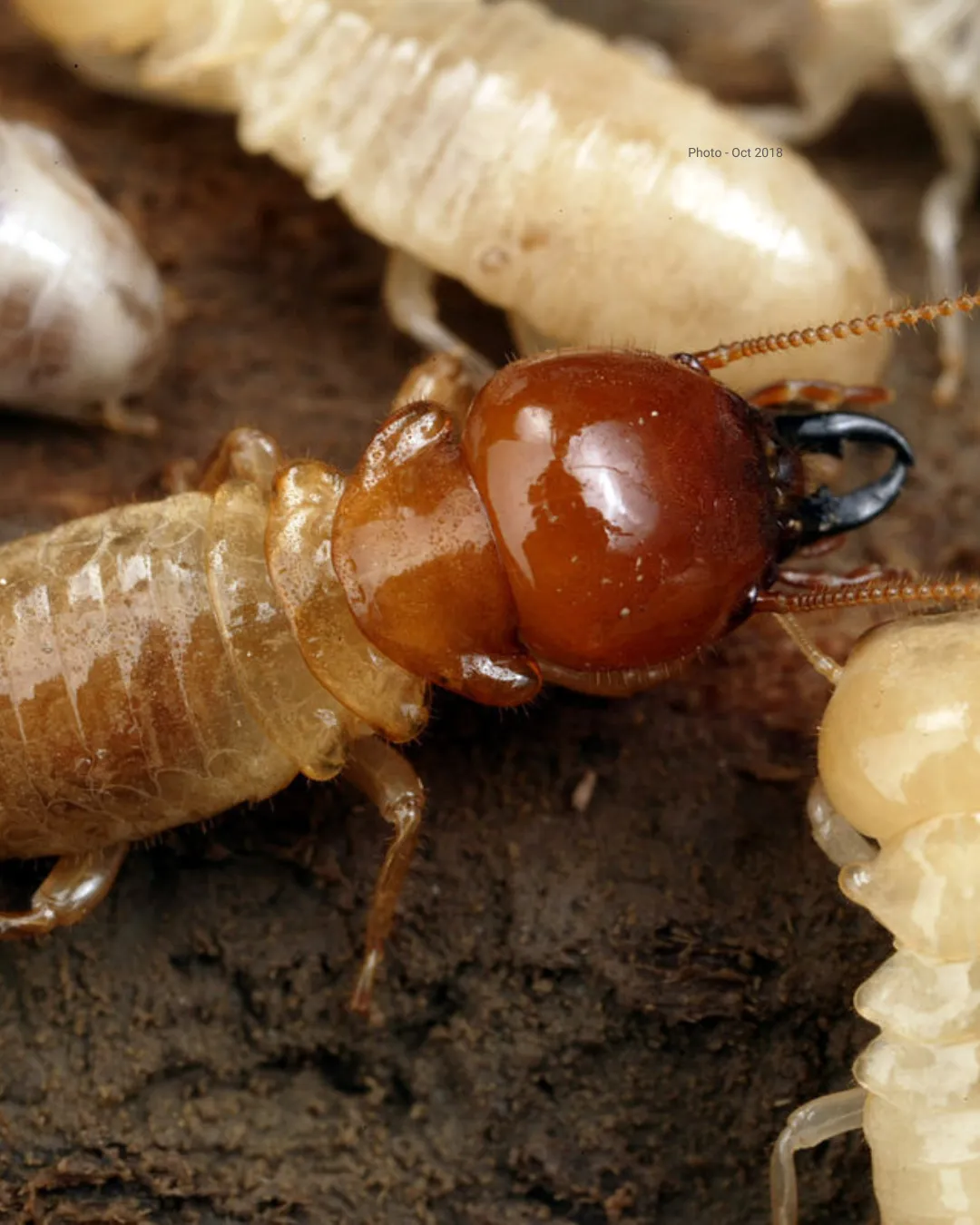Designed To Educate, Motivate & Inspire
The Western Way Journal

Termite Awareness: Protecting Your Property
The Silent Threat of Termites
Termites thrive in warmer climates, making spring and summer their most active seasons. These pests feed on cellulose-based plant materials, unfortunately, most homes provide ample supplies of this, whether through structural timbers, furniture, or paper products. Without proper preventative measures, termites can silently damage the structural integrity of a home, often before the homeowner even realizes there is a problem.
Identifying Termite Infestations
Signs of a Termite Infestation:
Mud Tubes: These pencil-like tubes can be found on exterior and interior walls, providing shelter for termites as they move between their colony and food source.
Wood Damage: Wood that sounds hollow when tapped or that is visibly cracked or crumbling can indicate termite activity.
Swarmers: The presence of winged termites or discarded wings inside your home can often be the first sign of an infestation.
Understanding the lifecycle of termites can also help homeowners anticipate and recognize signs of an infestation. Termites go through a metamorphosis, starting from eggs laid by a queen in an established colony. These eggs hatch into larvae, which then develop into one of several different types of termites: workers, soldiers, or reproductive termites (swarmers), each with specific roles in the colony.
Preventative Measures to Protect Your Property
Regular Inspections: Early detection is key to preventing serious damage. Schedule regular professional inspections to identify and treat infestations before they become extensive. Western Way Termite and Pest Services provides thorough inspections that can pinpoint potential and existing problems.
Moisture Control: Termites are attracted to moisture. Ensure that your home's foundation is properly ventilated and that downspouts and gutters are working correctly to direct water away from your home.
Secure Wood Surfaces: Treat wood surfaces with termite repellent or sealant and keep any wood, including firewood, away from the home’s foundation.
Landscape Maintenance: Regularly trim bushes and trees to keep them away from the house. Avoid using wood mulch and consider alternatives like rubber mulch that doesn’t attract termites.
The Role of Professional Termite Control
While DIY measures can provide some level of protection, professional termite control services offer more reliable solutions. Western Way Termite and Pest Services specializes in both preventive treatments and active termite management strategies. Our services include:
Soil treatments: To create a chemical barrier in the soil that prevents termites from entering.
Bait systems: Installed around your property to detect and control termite populations.
Direct wood treatments: Applied to infested areas or areas at risk of future infestation.
DIY Termite Control Myths: Separating Fact from Fiction
Myth 1: Boric Acid is an Effective Treatment for All Termite Problems
Fact: While boric acid can be effective as a preventative treatment when applied correctly, it is not a cure-all solution for termite infestations. This substance works best as a deterrent and is more effective against insects such as ants and cockroaches than against deep-rooted termite infestations. For comprehensive termite eradication, especially for large or deep infestations, professional treatment is usually necessary.
Myth 2: Orange Oil Can Eliminate Entire Termite Colonies
Fact: Orange oil has been touted for its ability to kill termites on contact. However, its effectiveness is generally limited to the areas where it is directly applied. Since termites often reside deep within wooden structures or underground, orange oil is unlikely to reach the colony's heart. This method also does not provide long-term protection against future infestations.
Myth 3: Ultrasonic Repellers Keep Termites Away
Fact: Ultrasonic repellers, which claim to use sound waves to drive pests away, have not been scientifically proven to be effective against termites. These devices are often marketed with misleading claims, and no credible studies have supported their efficacy for termite control.
Myth 4: DIY Termite Treatments Are Just as Effective as Professional Services
Fact: Over-the-counter termite treatments are generally less potent than the solutions used by professionals. Moreover, professional pest controllers have the training and tools to accurately identify termite species, assess the extent of an infestation, and apply treatments in a way that addresses the entire colony. Effective termite control often requires specialized knowledge and equipment that DIY methods lack.
Myth 5: Vinegar Can Kill and Repel Termites
Fact: Vinegar may kill some termites on contact, but it is not effective for eliminating or controlling an infestation. Like orange oil, vinegar does not penetrate deep enough into wood or soil to reach the colony, making it an unreliable method for serious termite problems.
Guidance for Homeowners
Instead of relying on DIY myths, homeowners should focus on prevention strategies that have been proven to work:
Regular Inspections: Schedule annual inspections with a professional to catch infestations early.
Moisture Control: Reduce moisture around the home, as termites are attracted to damp environments.
Physical Barriers: Consider installing physical termite barriers during construction or renovation.
Professional Treatments: For active infestations, always seek professional advice and treatment options tailored to your specific situation.
Landscaping Tips for Termite Prevention
Here are practical landscaping tips that can help prevent termites while keeping your garden beautiful and healthy.
1. Choose Termite-Resistant Plants
Some plants are known to be less attractive to termites either due to their physical properties or the chemicals they emit. Consider incorporating these into your garden:
Vetiver Grass: Known for its dense roots, it helps protect soil and limits termite access.
Marigolds: These flowers are believed to have natural repellent qualities against pests, including termites.
Garlic and Onions: Planting these can help repel various pests and might deter termites due to their strong odors.
2. Proper Placement of Garden Beds
Positioning garden beds and planters correctly is crucial in termite prevention:
Distance from the Home: Keep garden beds at least a few feet away from your home’s foundation. This separation prevents termites from using plant roots to bridge to the structure.
Elevate Wooden Planters: If using wooden planters, ensure they are elevated off the ground to avoid direct contact with soil where termites might thrive.
3. Correct Use of Mulch
Mulch is often used to retain moisture in the soil and keep weeds at bay but can also attract termites if not used properly:
Type of Mulch: Avoid wood mulch near your home’s foundation. Instead, use termite-resistant mulch types like cedar, which contains natural oils that repel termites, or rubber mulch, which does not attract termites.
Application: When applying mulch, leave a gap of at least 6 inches between the mulch layer and the wooden parts of your home’s structure. This gap helps reduce the risk of termites accessing your home from the soil.
4. Regular Maintenance
Regular yard maintenance is key to preventing termite infestation:
Prune Trees and Shrubs: Regularly prune trees and shrubs to avoid contact with your home’s walls and roof. This practice eliminates a potential bridge for termites.
Clear Dead Wood and Debris: Remove dead trees, stumps, and other plant debris promptly from your property. These can be breeding grounds for termites.
5. Moisture Control
Since termites are attracted to moisture, managing moisture levels in your yard can deter their presence:
Proper Drainage: Ensure that your landscaping design promotes proper drainage away from your home. Slope the terrain so that water runs away from your foundation.
Maintain Irrigation Systems: Fix leaky faucets and ensure that sprinkler systems do not spray directly onto your home’s foundation.
For more information on our services or to schedule an inspection, please visit Western Way Termites & Pest Services. Protect your investment and ensure peace of mind by choosing the right professionals for termite control.
Office:
8505 Church St Suite 7 Gilroy, CA 95020
Call
(408)
676-4774
Email:

Copyright 2024. All Right Reserved.
